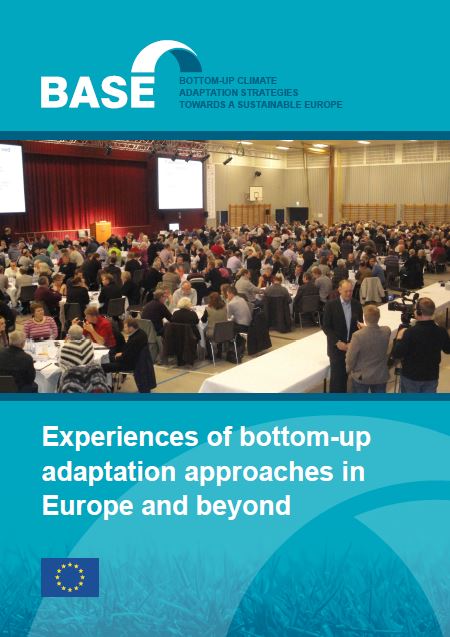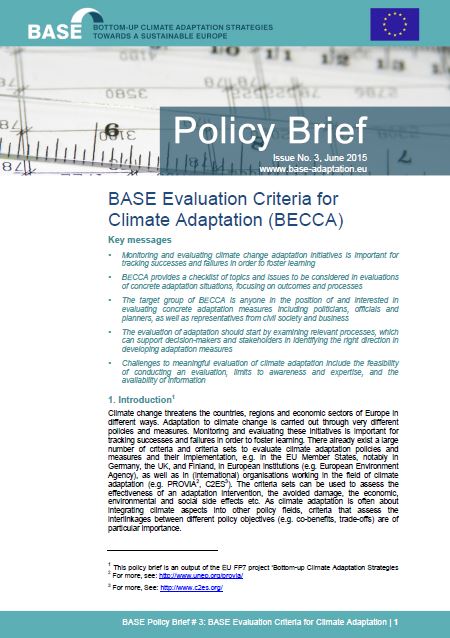Bottom-Up Climate Adaptation Strategies for a Sustainable Europe (BASE)
- Project
- Research Program
- Duration
-
-
The EU research project "Bottom-Up Climate Adaptation Strategies for a Sustainable Europe" (BASE) supported action for sustainable climate change adaptation in Europe. BASE made experiential and scientific information on adaptation meaningful, transferable and easily accessible to decision-makers at all levels. The project was funded under the EU's 7th Research Framework Programme (FP7).
The challenges
Climate change was expected to cause serious ecological, economic and social disruptions across Europe. Carefully planned adaptation could reduce these disruptions and, in some cases, yield benefits and business opportunities. However, decision-makers faced various obstacles when devising appropriate and sustainable strategies, including:
- Uncertainty: The ability to plan and design adaptation options was limited by uncertainties related to physical changes, socio-economic developments, and the costs and benefits of different approaches or time scales. Reducing this uncertainty was essential for developing strategies that would be resilient to extreme events and deliver net benefits across different scenarios.
- Assessment: Integrated Assessment Models could offer strategic, long-term and quantitative insights for adaptation activities, but required more accurate data and critical examination of the appropriate scale of analysis. Simultaneously, bottom-up process assessments had to build on past lessons and become more comparable. Improvements in both assessment approaches were needed to support critical decision-making.
- The adaptation gap: Strategic top-down policymaking was necessary to prevent mal-adaptation and ensure coherence across sectors. However, adaptation was highly context-specific, requiring bottom-up approaches reflecting local realities. Stakeholder engagement and analyses of policymaking processes were crucial to bridging the gap between top-down and bottom-up adaptation strategies.
Project aims
Between 2012 and 2016, BASE aimed to foster sustainable adaptation in Europe by enhancing the knowledge base on climate adaptation and improving its accessibility and usability for stakeholders. Specifically, the project:
- Compiled and analysed data on adaptation measures and their effectiveness to create a publicly available, comprehensive knowledge base. This included insights on social and economic benefits, sectoral costs, and policy implications.
- Developed and improved assessment methods and tools to evaluate climate impacts, vulnerabilities, risks and adaptation policies.
- Identified policy conflicts and synergies across levels and sectors to highlight strategies for more coherent and effective policymaking.
- Linked bottom-up knowledge with top-down approaches using innovative methods to evaluate the effectiveness, costs and benefits of adaptation strategies at different scales.
- Worked to bridge the gap between specific adaptation assessments and integrated strategic implementation.
- Promoted the inclusion of local knowledge and perceptions through participatory and deliberative methods, enabling co-designed and effective adaptation strategies.
- Disseminated project results via tools such as Climate-ADAPT to raise awareness of the impacts, costs and benefits of climate adaptation among policymakers and practitioners.
Case Studies
To gather practical insights, BASE conducted climate adaptation case studies across Europe. These case studies were selected to address both sector-specific challenges and cross-sectoral interactions, highlighting adaptation dynamics at multiple governance levels.
Ecologic Institute in BASE
Ecologic Institute led the uptake, transfer and dissemination of knowledge generated within BASE and coordinated stakeholder engagement on the impacts, costs and benefits of adaptation. The institute also contributed to the review of adaptation experiences and assessments of policy effectiveness in Europe and beyond.
Project Publications
BASE produced a wide range of publications to support evidence-based adaptation, including policy briefs, peer-reviewed articles, reports and online resources. These outputs provide practical insights and theoretical frameworks for adaptation planning. A selection of publications includes:
- BASE Consortium (2016): Adaptation Inspiration Book – 23 European cases of climate change adaptation. BASE project, EU FP7.
- BASE Consortium (2013): Policy integration and knowledge use in the EU adaptation strategy. Deliverable 2.1, BASE project, EU FP7.
- BASE Consortium (2014): Knowledge use, knowledge needs and policy integration in Member States. Deliverable 2.2, BASE project, EU FP7.
- BASE Consortium (2015): BASE Evaluation Criteria for Climate Adaptation (BECCA). Deliverable 2.3, BASE project, EU FP7.
- BASE Consortium (2013): Model catalogue and data exchange plan. Deliverable 3.1, BASE project, EU FP7.
- BASE Consortium (2014): Report on the model developments in the sectoral assessments. Deliverable 3.2, BASE project, EU FP7.
- BASE Consortium (2014): Selected integrated assessment models for top-down analysis used in BASE. Deliverable 3.3, BASE project, EU FP7.
- BASE Consortium (2015): Uncertainty analysis in integrated assessment modelling. Deliverable 3.4, BASE project, EU FP7.
- BASE Consortium (2013): BASE common case study approach. Deliverable 4.1, BASE project, EU FP7.
- BASE Consortium (2015): Experiences in bottom-up adaptation approaches in Europe and elsewhere. Deliverable 4.2, BASE project, EU FP7.
- BASE Consortium (2014): Climate change, impact and adaptation scenarios for case studies. Deliverable 5.1, BASE project, EU FP7.
- BASE Consortium (2015): Economic evaluation of adaptation options. Deliverable 5.2, BASE project, EU FP7.
- BASE Consortium (2015): Participation in climate change adaptation. Deliverable 5.3, BASE project, EU FP7.
- BASE Consortium (2016): Adapting to climate change: Comparison of case studies. Deliverable 5.5, BASE project, EU FP7.
- BASE Consortium (2013): Protocol for data formats needed for up-scaling and modelling. Deliverable 6.1, BASE project, EU FP7.
- BASE Consortium (2014): Methodological framework for upscaling and integrating bottom-up approaches for European analysis and assessment of the impacts, costs and benefits of climate adaptation. Deliverable 6.2, BASE project, EU FP7.
- BASE Consortium (2016): EU-wide economic evaluation of adaptation to climate change. Deliverable 6.3, BASE project, EU FP7.
- BASE Consortium (2016): Process tool for testing and evaluating future plans for adaptation – using storylines and pathways for adaptation to climate change across Europe. Deliverable 6.4, BASE project, EU FP7.
- BASE Consortium (2015): Strategies for enhancing policy coherence: mainstreaming adaptation into key-sectoral and development policies. Deliverable 7.1, BASE project, EU FP7.
- BASE Consortium (2015): Synthesis of integrated climate policy perspectives. Deliverable 7.2, BASE project, EU FP7.
- BASE Consortium (2016): Guidelines for EU and Member State policy makers. Deliverable 7.3, BASE project, EU FP7.
- BASE Consortium (2013): Communication and Dissemination Plan. Deliverable 8.2, BASE project, EU FP7.
Further publications are available on the BASE project website and through Ecologic Institute's publication database.












